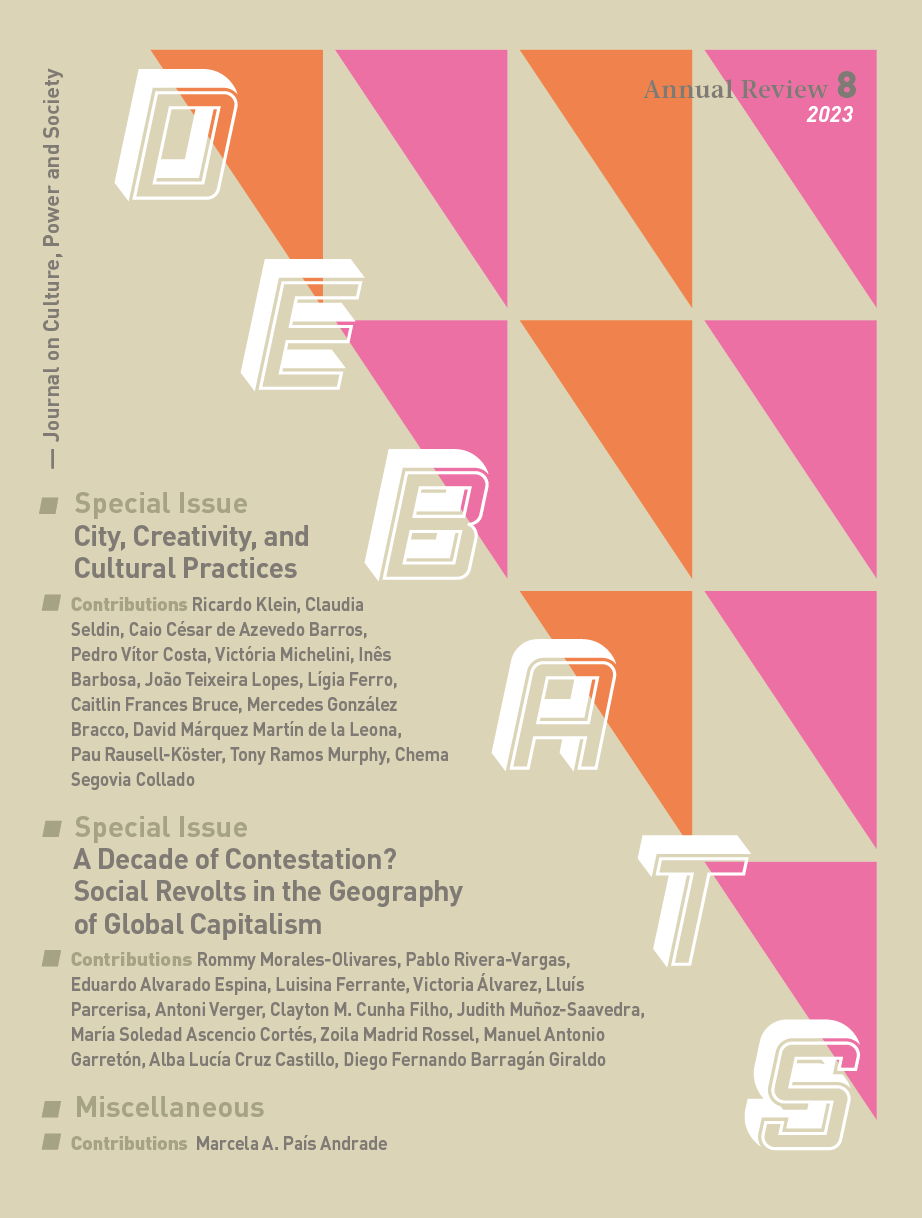The cultural sector in the context of cultural change in local settings in Europe
Keywords:
cultural change; cultural policy; cultural paradigm; cultural model; local sphereAbstract
Social changes are not always instantly taken up or fully reflected in the cultural sector. This gap sparks tensions that can lead to a crisis. This paper builds a theoretical framework to grasp how the cultural sector can transform such change into cultural actions and policies. After
analysing current models and paradigms of public policies in Europe, the author proposes a dynamic, four-vector model to address cultural change. The paper suggests avenues for future cultural action, stressing the local sphere as the most promising one for implementing new policies. The model provides a sound basis for evaluating arguments — a feature that is likely to foster its adoption at the local level.
Downloads
References
Arts Council England (2020). Equality, Diversity and the Creative Case. A data report.
Autissier, A.M. (2008). Pour une réorientation fondamentale des politiques culturelles, Questions de communication, 13.239-250.
Baltà, J. and Dragi evic, M. (2017) Los derechos culturales y su contribución al desarrollo sostenible: implicaciones para la política cultural, Revista Internacional de Política Cultural, 23:2.159-173.
Bardieri, N. (2021). The right to participate in urban cultural life: from inequalities to equity. GOLD VI Working Paper Series #06.
Bonet, Ll. (2016). La dimensión sectorial de las políticas culturales en España. Balance, límites y perspectivas. Treinta años de políticas culturales en España. PUV, Valencia. 23-45.
Bonet, Ll. and Négrier E. (2019). La participación cultural en la tensión dialéctica entre democratización y democracia cultural. El desarrollo de audiencias en España. Documentos de Estudios de Ocio, nº 64.
Cultural Leadership Programme, various authors (2009). Governance now: the hidden challenge of leadership. www. culturalleadership.org.uk
Dubois, V. (et al.) (2017). Le politique, l’artiste et le gestionnaire. Edítions du croquant, Vulaines-sur-Seine.
Dubois, V. (2016). El “modelo francés” y su “crisis”: ambiciones, ambigüedades y retos de una política cultural. Revista Debats, vol 130:2, 33-52.
Eagleton, T. (2017). Cultura. Ed. Taurus, Barcelona.
Fernández Rodríguez, C.J. and Heikkila, R. (2011). El debate sobre el omnivorismo cultural. Revista Internacional de Sociología, Vol 69:3, 585-606.
Figes, O. (2020). Los Europeos. Ed. Taurus, Barcelona.
IETM (2020). IDEA, Inclusion, Diversity, Equality and Accessibility. https://www.ietm.org/en/publications Jancovich, L. and Stevenson, D. (2021). Cultural Participation. Conjunctions, vol.7, no.2, pp.1-8. KEA, European Affairs, Deloitte (2021). Market Analysis of the Cultural and Creative Sectors in Europe.
González-Piñero, M. (2021). Claves de la innovación en el sector cultural: origen, evolución y revolución. La innovación en la gestión de la cultura. 17-63. Editorial Universitat Barcelona.
Gray C. (2007). Commodification and instrumentality in cultural policy. International Journal of Cultural Policy. 13:2, 203-215.
Lechelt, E. and Cunningham, M. (2021). The Politics of Participation in Cultural Policy Making. Conjunctions, vol.7, no.2.1-12.
Márquez Martín de la Leona, D. (2018). El patronato como mejora en la gobernanza de las instituciones públicas culturales. Estudios de progreso, Fundación Alternativas.
Menger, P-M. (2016). Arte, politización y acción pública. Revista Debats, vol 130:2, 73-98.
Mangset, P. (2020) ¿El fin de la política cultural? 1, Revista Internacional de Política Cultural, 26:3, 398-411
Rius-Ulldemolins, J. (2020). Cambio social y cambio artístico: autonomía de la esfera artística e influencia de la estructura en la sociología de las artes. Política y Sociedad 57(1), 217-239.
Rius-Ulldemolins, J. (2016). El sistema de la política cultural en el Estado Español desde la recuperación de la democracia. Treinta años de políticas culturales en España. PUV, Valencia. 123-161.
Rius-Ulldemolins, J., Pecourt, J. and Rubio-Arostegui, J.A. (2019). Contribución al análisis sociológico de la creatividad y la digitalización del campo cultural: creación, intermediación y crisis. Arbor, 195 (791): a491.
Rubio-Arostegui, J.A., Rius-Ulldemolins, J. (2020). Las políticas culturales en el sur de Europa tras la crisis global: su impacto en la participación cultural. Revista Española de Sociología, 29 (1), 33-48.
Rubio-Arostegui, J.A., and Rius-Ulldemolins, J. (2018): Cultural policies in the South of Europe after the global economic crisis: is there a Southern model within the framework of European convergence? International Journal of Cultural Policy.
Rubio-Arostegui, J.A. and Rius-Ulldemolins, J. (2015): Cultura y políticas públicas después del diluvio. Las ciencias sociales y la refundación de la política cultural. Política y Sociedad, Vol. 52, Issue 1: 27-52.
Yudice, G. (2002). El recurso de la cultura. Usos de la cultura en la era global. Ed. Gedisa, Barcelona.
Zimmer, A. and Toepler, S. (1996). Cultural Policies and the Welfare State: The Cases of Sweden, Germany, and The United States, The Journal of Arts Management, Law and Society, 26, 3: 167-193.
Downloads
Published
How to Cite
Issue
Section
License
Without prejudice to the provisions of article 52 of Spanish Law 22/1987 of November 11 on Intellectual Property, BOE (official state bulletin) of November 17, 1987, and pursuant to said legislation, the author(s) surrender(s) free of charge its rights of edition, publication, distribution and sale of the article, for its publication in Debats. Journal on Culture, Power and Society.
Debats. Journal on Culture, Power and Society is published under the Creative Commons license system in accordance with the «Recognition - Non-Commercial (by-nc) modality: The generation of derivative works is permitted provided that commercial use is not made. Nor can the original work be used for commercial purposes».
Thus, when the author submits his/her contribution, he/she explicitly accepts this assignment of publishing and publishing rights. Authors also authorize Debats. Journal on Culture, Power and Society to include their work in an issue of the journal to be distributed and sold.











